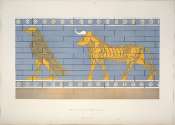Assyriologist claims to have solved archaeological mystery from 700 BC
Ancient symbols on a 2,700-year-old temple, which have baffled experts for more than a century, have been explained by Trinity Assyriologist Dr. Martin Worthington.

Ancient symbols on a 2,700-year-old temple, which have baffled experts for more than a century, have been explained by Trinity Assyriologist Dr. Martin Worthington.
Archaeology
4 hours ago
0
13

Evidence from archaeological sites in the medieval English city of Winchester shows that English red squirrels once served as an important host for Mycobacterium leprae strains that caused leprosy in people, researchers report ...
Archaeology
7 hours ago
0
2
Archaeology, archeology, or archæology (from Greek ἀρχαιολογία, archaiologia – ἀρχαῖος, archaīos, "primal, ancient, old"; and -λογία, -logia) is the science that studies human cultures through the recovery, documentation, analysis, and interpretation of material remains and environmental data, including architecture, artifacts, features, biofacts, and landscapes. Because archaeology's aim is to understand humankind, it is a humanistic endeavor. Due to its analysis of human cultures, it is a subset of anthropology, which contains: physical anthropology, cultural anthropology, archaeology, and linguistic anthropology. There is debate as to what archaeology's goals are. Some goals include the documentation and explanation of the origins and development of human cultures, understanding culture history, chronicling cultural evolution, and studying human behavior and ecology, for both prehistoric and historic societies[citation needed].
Archaeologists are also concerned with the study of methods used in the discipline, and the theoretical and philosophical underpinnings underlying the questions archaeologists ask of the past. The tasks of surveying areas in order to find new sites, excavating sites in order to recover cultural remains, classification, analysis, and preservation are all important phases of the archaeological process. Given the broad scope of the discipline, there is cross-disciplinary research in archaeology. It draws upon anthropology, history, art history, classics, ethnology, geography, geology, linguistics, physics, information sciences, chemistry, statistics, paleoecology, paleontology, paleozoology, paleoethnobotany, and paleobotany.
This text uses material from Wikipedia, licensed under CC BY-SA